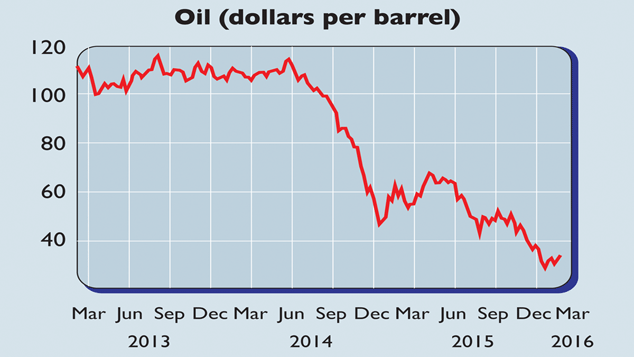Have oil prices hit bottom?
Oil prices jumped last Tuesday on news of a deal to freeze production between Saudi Arabia and Russia – but not for long.

Get the latest financial news, insights and expert analysis from our award-winning MoneyWeek team, to help you understand what really matters when it comes to your finances.
You are now subscribed
Your newsletter sign-up was successful
Want to add more newsletters?

Twice daily
MoneyWeek
Get the latest financial news, insights and expert analysis from our award-winning MoneyWeek team, to help you understand what really matters when it comes to your finances.

Four times a week
Look After My Bills
Sign up to our free money-saving newsletter, filled with the latest news and expert advice to help you find the best tips and deals for managing your bills. Start saving today!

Oil prices jumped last Tuesday on news of a deal to freeze production between Saudi Arabia and Russia, but finished the week pretty much where they started it. That's "probably a fair reflection" of the deal's significance, says Malcolm Graham-Wood on MalcysBlog.com. A freeze on production, while "laudable, ain't going to change the market". There is still a glut, which will look even worse next month when refiners do their usual maintenance ahead of the driving season and thus cut back on buying oil in the market.
Even the agreement not to raise output at record highs in both countries depends on other countries signing up, adds the Financial Times. Heavyweight producer Iran, keen to secure market share as sanctions are eased, hasn't exactly rushed to endorse the deal. "Short of a revolution in Riyadh", says Nick Butler in the same paper, it's hard to see prices going above $50 a barrel for three years.
But is the bearishness in the oil market overdone? An immediate price surge may be off the table, but prices could well have hit bottom. They've held above $30 for a month; the glut increasingly looks to be "priced in"; and the Russia-Saudi deal (the first between a member of oil cartel Opec and a non-member for 15 years) shows producers are willing to explore ways of eventually cutting output.
MoneyWeek
Subscribe to MoneyWeek today and get your first six magazine issues absolutely FREE

Sign up to Money Morning
Don't miss the latest investment and personal finances news, market analysis, plus money-saving tips with our free twice-daily newsletter
Don't miss the latest investment and personal finances news, market analysis, plus money-saving tips with our free twice-daily newsletter
Meanwhile, drilling activity, and hence future output in America, continues to fall. The number of operational oil rigs has fallen to just over 500 from 2,000 a few years ago, says Liam Halligan in The Sunday Telegraph. With the International Energy Agency expecting supply and demand to rebalance by 2017, prices may begin to tick up as investors look forward to the glut disappearing.
And once they do turn the corner, they could rise faster than everyone expects, says the FT'sJohn Dizard. This is due to the structure of the oil futures market. At present oil producers have heavy debt loads or large populations to keep happy, so they have kept pumping oil despite ample supplies. This has fuelled demand for storage and driven up the price of oil futures compared to spot prices, creating a pattern called "contango".
This in turn has prompted speculators to reinforce the trend and price pattern via an oil "cash-and-carry trade": selling short-dated oil and buying long-dated futures. But once investors think the spot price is set to rise, they will unwind their positions, sending futures prices down and spot prices up just as currency carry trades can quickly unwind and move prices. If oil has hit "peak bear", you may be surprised at how fast it snaps back.
Get the latest financial news, insights and expert analysis from our award-winning MoneyWeek team, to help you understand what really matters when it comes to your finances.

-
 Should you buy an active ETF?
Should you buy an active ETF?ETFs are often mischaracterised as passive products, but they can be a convenient way to add active management to your portfolio
-
 Power up your pension before 5 April – easy ways to save before the tax year end
Power up your pension before 5 April – easy ways to save before the tax year endWith the end of the tax year looming, pension savers currently have a window to review and maximise what’s going into their retirement funds – we look at how